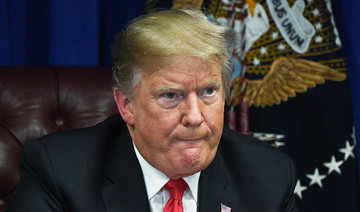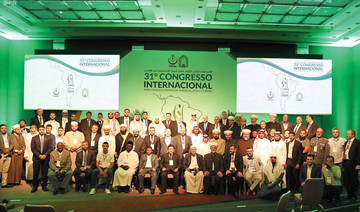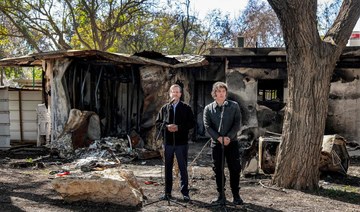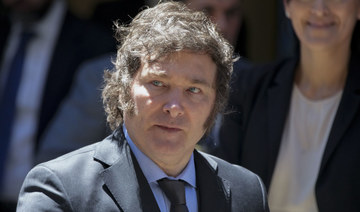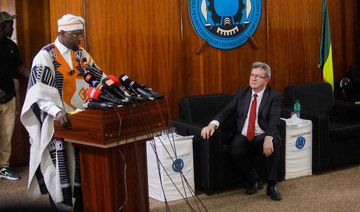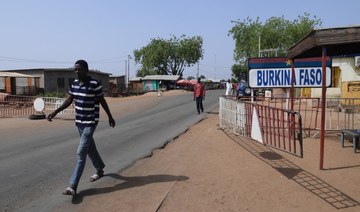SAO PAULO: Scientists warn that Brazil’s president-elect could push the Amazon rainforest past its tipping point — with severe consequences for global climate and rainfall.
Jair Bolsonaro, who takes office Jan. 1, claims a mandate to convert land for cattle pastures and soybean farms, calling Brazil’s rainforest protections an economic obstacle.
Brazilians on Oct. 28 elected Bolsonaro, a far-right candidate who channeled outrage at the corruption scandals of the former government and support from agribusiness groups.
Next week global leaders will meet in Poland for an international climate conference to discuss how to curb climate change, and questions about Brazil’s role in shaping the future of the Amazon rainforest after Bolsonaro’s election loom large. New Brazilian government data show the rate of deforestation — a major factor in global warming — has already increased over the past year.
Brazil contains about 60 percent of the Amazon rainforest, and scientists are worried.
It’s nearly impossible to overstate the importance of the Amazon rainforest to the planet’s living systems, said Carlos Nobre, a climate scientist at the University of Sao Paulo.
Each tree stores carbon absorbed from the atmosphere. The Amazon takes in as much as 2 billion tons of carbon dioxide a year and releases 20 percent of the planet’s oxygen, earning it the nickname “the lungs of the planet.”
It’s also a global weather-maker.
Stretching 10 times the size of Texas, the Amazon is the world’s largest rainforest. Billions of trees suck up water through deep roots and bring it up to their leaves, which release water vapor that forms a thick mist over the rainforest canopy.
This mist ascends into clouds and eventually becomes rainfall — a cycle that shapes seasons in South America and far beyond.
By one estimate, the Amazon creates 30 to 50 percent of its own rainfall.
Now the integrity of all of three functions — as a carbon sink, the Earth’s lungs, and a rainmaker — hangs in the balance.
On the campaign trail, Bolsonaro promised to loosen protections for areas of the Brazilian Amazon designated as indigenous lands and nature reserves, calling them impediments to economic growth. “All these reserves cause problems to development,” he told supporters.
He has also repeatedly talked about gutting the power of the environmental ministry to enforce existing green laws.
“If Bolsonaro keeps his campaign promises, deforestation of the Amazon will probably increase quickly — and the effects will be felt everywhere on the planet,” said Paulo Artaxo, a professor of environmental physics at the University of Sao Paulo.
Bolsonaro’s transition team did not respond to an interview request from the Associated Press.
Brazil was once seen as a global environmental success story. Between 2004 and 2014, stricter enforcement of laws to safeguard the rainforest — aided by regular satellite monitoring and protections for lands designated reserves for indigenous peoples — sharply curbed the rate of deforestation, which peaked in the early 2000s at about 9,650 square miles a year (25,000 square kilometers).
After a political crisis engulfed Brazil, leading to the 2016 impeachment of president Dilma Rousseff, enforcement faltered. Ranchers and farmers began to convert more rainforest to pastureland and cropland. Between 2014 and 2017, annual deforestation doubled to about 3,090 square miles (8,000 square kilometers). Most often, the trees and underbrush cut down are simply burned, directly releasing carbon dioxide, said Artaxo.
“In the Brazilian Amazon, far and away the largest source of deforestation is industrial agriculture and cattle ranching,” said Emilio Bruna, an ecologist at the University of Florida in Gainesville.
Now observers are parsing Bolsonaro’s campaign statements and positions as a congressman to anticipate what’s next for the Amazon.
Bolsonaro — who some call “tropical Trump” because of some similarities to US President Donald Trump — is a former army captain with a knack for channeling outrage and generating headlines. As a federal congressman for 27 years, he led legislative campaigns to unravel land protections for indigenous people and to promote agribusiness. He also made derogatory comments about minorities, women, and LGBT people.
Much of his support comes from business and farming interests.
“These farmers are not invaders, they are producers,” said congressman and senator-elect Luiz Carlos Heinze, a farmer and close ally of Bolsonaro. He blamed past “leftist administrations” for promoting indigenous rights at the expense of farmers and ranchers.
“Brazil will be the biggest farming nation on Earth during Bolsonaro’s years,” said Heinze.
Indigenous-rights advocates are worried about the new direction signaled. “Bolsonaro has repeatedly said that indigenous territories in the Amazon should be opened up for mining and agribusiness, which goes completely in the opposite direction of our Constitution,” said Adriana Ramos, public policy coordinator at Social Environmental Institute in Brasilia, a non-governmental group.
In a Nov. 1 postelection interview with Catholic TV, Bolsonaro said, “We intend to protect the environment, but without creating difficulties for our progress.”
Bolsonaro has repeatedly said that Brazil should withdraw from the Paris Climate Accord, a treaty his predecessor signed in 2016 committing to reduce carbon emissions 37 percent over 2005 levels by 2030. After the election, he has publicly wavered.
Meanwhile he has named a climate-change denier, Ernesto Araujo, to become the next foreign minister.
Nelson Ananias Filho, sustainability coordinator at Brazil’s National Agriculture and Cattle Raising Confederation, which backed Bolsonaro’s campaign, said, “Brazil’s agribusiness will adapt to whatever circumstances come.”
Whether or not Brazil formally remains in the Paris Climate Accord, the only way for the country to make its emission targets is to completely stop deforestation by 2030 and to reduce agricultural emissions, said Nobre, the climate scientist. “If Bolsonaro keeps moving in the current direction, that’s basically impossible.”
There’s another danger lurking in deforestation.
Aside from the oceans, tropical forests are the most important regions on the planet for putting water vapor in the air, which eventually becomes rainfall. “It’s why we have rain in the American Midwest and other inland areas — it’s not just the Amazon, but it’s the largest tropical rainforest,” said Bill Laurance, a tropical ecologist at James Cook University in Cairns, Australia.
Carlos Nobre and Thomas Lovejoy, an environmental scientist at George Mason University, have estimated that the “tipping point for the Amazon system” is 20 to 25 percent deforestation.
Without enough trees to sustain the rainfall, the longer and more pronounced dry season could turn more than half the rainforest into a tropical savannah, they wrote in February in the journal Science Advances.
If the rainfall cycle collapses, winter droughts in parts of Brazil, Uruguay, Paraguay, and Argentina could devastate agriculture, they wrote. The impacts may even be felt as far away as the American Midwest, said Laurance.
Bolsonaro’s rhetoric about potentially dismantling the environmental ministry and rolling back indigenous rights worries Nobre who says, “I am a scientist, but I am also a Brazilian citizen, and a citizen of the planet.”
Scientists warn new Brazil president may smother rainforest
Scientists warn new Brazil president may smother rainforest

- Brazil contains about 60 percent of the Amazon rainforest, and scientists are worried
- The Amazon takes in as much as 2 billion tons of carbon dioxide a year and releases 20 percent of the planet’s oxygen
Argentine president begins unusual visit to Spain, snubbing officials and courting the far-right

- The brash President Javier Milei has no plans to meet Spain's PM — nor any other government official
- He will instead attend a far-right summit Sunday hosted by Sánchez’s fiercest political opponent, the Vox party
BUENOS AIRES, Argentina: Even before kicking off a three-day visit to Madrid on Friday, Argentina’s libertarian President Javier Milei stirred controversy, accusing the socialist government of bringing “poverty and death” to Spain and weighing in on corruption allegations against the prime minister’s wife.
In such circumstances, a typical visiting head of state may strive to mend fences with diplomacy.
Not Milei. The brash economist has no plans to meet Spanish Prime Minister Pedro Sánchez during his three days in the Spanish capital — nor the Spanish king, nor any other government official. Instead, he’ll attend a far-right summit Sunday hosted by Sánchez’s fiercest political opponent, the Vox party.
The unorthodox visit was business as usual for Milei, a darling of the global far right who has bonded with tech billionaire Elon Musk and praised former US President Donald Trump. Earlier this year on a trip to the United States, Milei steered clear of the White House and took the stage at the Conservative Political Action Conference, or CPAC, where he railed against abortion and socialism and shared a bear hug with Trump.
Milei presented his 2022 book, “The Way of the Libertarian,” in Madrid Friday at a literary event organized by La Razón, a conservative Spanish newspaper.
The book — withdrawn from circulation in Spain earlier this month because the back-flap biography erroneously said Milei had earned a doctorate — traces his meteoric rise in politics from eccentric TV personality to national lawmaker and outlines his radical free-market economic ideas.
To thunderous applause, Milei condemned socialism as “an intellectual fraud and a horror in human terms.”
“The good thing is that the spotlight is shining on us everywhere and we are making the reds (leftists) uncomfortable all over the world,” Milei said.
He took the opportunity to promote the results of his harsh austerity campaign in Argentina, celebrating a decline in monthly inflation in April though making no mention of the Buenos Aires subway fares that more than tripled overnight.
Repeating a campaign pledge to eliminate Argentina’s central bank — without giving further details — Milei promised to make Argentina “the country with the most economic freedom in the world.”
At the event Milei gave a huge hug to his ideological ally Santiago Abascal, the leader of the hard-right Vox party and the only politician with whom Milei has actual plans to meet in Madrid.
The Vox summit Sunday seeks to bring together far-right figures from across Europe in a bid to rally the party’s base ahead of European parliamentary elections in June. Milei described his attendance a “moral imperative.” He also has plans to meet Spanish business executives Saturday.
Tensions between Milei and Sánchez have simmered since the moment the Spanish prime minister declined to congratulate the libertarian economist on his shock election victory last November.
But hostility exploded earlier this month when one of Sánchez’s ministers suggested Milei had taken narcotics. The Argentine presidency responded with an unusually harsh official statement accusing Sánchez’s government of “endangering the middle class with its socialist policies that bring nothing but poverty and death.”
The lengthy government statement also accused Sánchez of having “more important problems to deal with, such as the corruption accusations against his wife.”
The allegations of influence peddling and corruption brought by a right-wing group against Sánchez’s wife, Begoña Gómez, had prompted Sánchez, one of Europe’s longest serving Socialist leaders, to consider stepping down.
Senegal’s new president welcomes challenge to help reconcile ECOWAS with Mali, Burkina Faso, and Niger

- Ghana’s President Akufo-Addo sought Bassirou Diomaye Faye's help during their meeting in Accra on Friday
- Faye said that he hoped to convince the countries to “come back and share our common democratic values and what we stand for”
ACCRA: Ghana’s president Friday urged his visiting Senegalese counterpart to use his goodwill within the Economic Community of West African States to help resolve disputes with Niger, Burkina Faso and Mali.
President Bassirou Diomaye Faye arrived in the capital Accra early in the morning after visiting Nigeria’s President Bola Ahmed Tinubu.
Niger, Mali and Burkina Faso in January 2024 announced they were leaving ECOWAS after they were suspended by the group over military coups in all three nations.
“We are lucky to have a new leader in place because I think he is also going to help us to try and resolve the big problem that we have in the ECOWAS community,” Ghana’s President Nana Akufo-Addo said after meeting Faye.
“President Faye is very committed to seeing what he and the rest of us can do to reach out and revive the dialogue.”
Speaking to reporters after bilateral talks, Akufo-Addo said Faye had demonstrated commitment to ECOWAS efforts to bring the three countries to the table for further talks and back to the bloc.
Faye, 44, won a resounding victory as an anti-establishment candidate promising major reforms to become Senegal’s youngest-ever president.
His election has been seen as an inspiration for change in contrast to some of the continent’s aging leaders who have been in power for years and to other countries now run by military governments.
He welcomed the challenge to help reconcile ECOWAS with Mali, Burkina Faso, and Niger.
ECOWAS “is going through difficult times but we are going to do all we can to consolidate the gains made in integration, in a spirit of common, fraternal solidarity,” Faye told reporters.
Unity was “primordial” in the region, he added.
Earlier in Nigeria, Faye said that alongside Nigeria, which currently chairs ECOWAS, he hoped to convince the countries to “come back and share our common democratic values and what we stand for.”
Nancy Pelosi’s husband’s attacker jailed for 30 years

SAN FRANCISCO: A man who attacked the elderly husband of former US House Speaker Nancy Pelosi with a hammer was sentenced Friday to 30 years in prison.
David DePape was convicted last year of breaking into the couple’s San Francisco home and bludgeoning Paul Pelosi in a horrifying attack captured on police bodycam.
At the time of the October 2022 assault, Democrat Nancy Pelosi was second in line to the presidency and a regular target of outlandish far-right conspiracy theories.
Jurors in his trial last year heard how DePape — a Canadian former nudist activist who supported himself with occasional carpentry work — had initially planned to target Nancy Pelosi, planning to smash her kneecaps if she did not admit to her party’s “lies.”
On arriving at their home armed with rope, gloves and duct tape, DePape instead encountered her then-82-year-old husband, and kept asking, “Where’s Nancy?“
During what DePape told officers was a “pretty amicable” conversation with Paul Pelosi, the husband managed to call for help from law enforcement officers.
Moments later when police arrived DePape hit Pelosi with a hammer before officers rushed at him and took the weapon away.
Pelosi was knocked unconscious and had his skull fractured. He spent almost a week in a hospital, where he underwent surgery.
Nancy Pelosi was not at home the night of the attack.
Prosecutors had asked the federal court in San Francisco to sentence DePape to 40 years in prison.
In the lead up to Friday’s sentencing, Nancy Pelosi had asked the judge to impose a “very long” sentence for an attack that “has had a devastating effect on three generations of our family.”
“Even now, eighteen months after the home invasion and assault, the signs of blood and break-in are impossible to avoid.
“Our home remains a heartbreaking crime scene,” she wrote, according to court documents cited by the San Francisco Chronicle.
On Friday her office said the family was proud of Paul Pelosi “and his tremendous courage in saving his own life on the night of the attack and in testifying in this case.”
DePape had pleaded not guilty to charges that included assault on a family member of a US official, and attempted kidnapping of a US official.
While not denying the attack, his defense rested on contesting federal prosecutors’ claims that he had targeted Nancy Pelosi in her official capacity.
Instead, his lawyers argued that DePape was driven to target a number of prominent liberal figures, due to his exposure to a web of obscure conspiracy theories.
In social media posts, DePape shared QAnon theories and false claims that the last US election was stolen.
The trial heard how DePape did not intend to stop his supposed anti-corruption crusade with Pelosi, and had drawn up a list of other targets including a feminist academic whom he accused of turning US schools into “pedophile molestation factories.”
Other personalities the defendant admitted wanting to attack included California Governor Gavin Newsom, President Joe Biden’s son Hunter, and actor Tom Hanks.
Jurors took less than 10 hours to reject DePape’s explanation of the attack, which took place just a few days before the US midterm elections.
The attack itself became politicized in the weeks after it occurred, with some members of the Republican Party mocking the incident and suggesting lurid and unsubstantiated explanations for why there was a man in Pelosi’s house late at night.
US Attorney General Merrick Garland said Friday that DePape’s sentence should serve as a warning that attacks on political figures and their families were unacceptable.
“In a democracy, people vote, argue, and debate to achieve the policy outcome they desire,” he said.
“But the promise of democracy is that people will not employ violence to affect that outcome.
“The Justice Department will aggressively prosecute those who target public servants and their families with violence.”
Burkina loyalists rally after gunfire near presidency

- Burkina Faso news agency AIB reported that an individual had tried to attack a guard at the palace but there were no injuries or damage
- Junta leader Traore seized power in a coup on September 30, 2022, deposing a military regime that earlier ousted the elected president Roch Marc Christian Kabore
OUAGADOUGOU, Burkina Faso: Hundreds of demonstrators rallied in Burkina Faso’s capital Friday in support of the country’s military rulers after gunfire was reported near the presidency, AFP reporters said.
Demonstrators gathered at a roundabout in central Ouagadougou, vowing to protect the rule of President Ibrahim Traore.
Earlier in the afternoon, “there were shots fired near the presidential palace,” said one demonstrator, Moussa Sawadogo.
“We do not know what is going on but we are there to stop anything from happening.”
Burkina Faso news agency AIB reported that an individual had tried to attack a guard at the palace but there were no injuries or damage.
Security forces closed off access to the area around the palace, AFP reporters saw.
The landlocked West African nation has been run by a military regime since mutinying soldiers deposed elected president Roch Marc Christian Kabore in 2022.
Junta leader Traore then seized power in another coup on September 30, 2022.
He established a transitional government and legislative assembly for 21 months, a period set to expire on July 1.
National consultations on the next steps in the transition to civilian rule are scheduled for May 25 to 26.
Since 2015, Burkina’s forces have been struggling to combat jihadist insurgencies that have killed thousands of people and forced around two million from their homes — violence that the army’s leaders used to justify their coups.
Zelensky rejects Olympic truce call, saying it could help Russia

- Zelensky said he had spoken to French President Emmanuel Macron who made the appeal told him Russian President Putin cannot be trusted
- Putin earlier on Friday also suggested that Moscow would not support the idea of a truce during the games in Paris this summer
KYIV: Ukrainian President Volodymyr Zelensky in an interview with AFP on Friday rejected a French call for an Olympic truce this summer, saying it could just help Russia move its troops and equipment.
In an interview with AFP on Friday, Zelensky said he had spoken to French President Emmanuel Macron who made the appeal and told him: “Let’s be honest... Emmanuel, I don’t believe it.”
“Who can guarantee that Russia will not use this time to bring its forces to our territory?” Zelensky said, adding: “First of all, we don’t trust Putin.”
“We are against any truce that plays into the hands of the enemy,” he said.
“If it’s a truce, an Olympic truce for the duration of the Olympics, a land truce, they will have an advantage,” he said, explaining that there was “a risk that they will bring heavy equipment to our territory and no one will be able to stop them.”
Russian President Vladimir Putin earlier on Friday also suggested that Moscow would not support the idea of a truce during the games in Paris this summer.
Asked during a visit to China whether he backed Macron’s idea, Putin said: “I think these Olympic principles, including the ‘Olympic truce’ are very right.”
But he added: “Today’s international sporting officials are themselves disobeying the principles of the Olympic charter.”
He accused sports bodies of “not allowing our athletes to perform at the games with our banner, flag and our national music, our anthem.”
“They are committing violations against us and demand fulfilment from us. Dear friends: we won’t get far that way. No one has ever come to an agreement that way,” Putin said.
Macron had restated on Friday his idea of “an Olympic truce so that Russia ceases its current operations” in Ukraine.
Macron also thanked Chinese President Xi Jinping last week for backing the idea of a truce in all conflicts, including Ukraine, during the Paris Olympics.
Only 25 percent of needed air defense
Zelensky also said his country needed over a hundred aircraft to counter Russian air power and said Ukraine only had a quarter of the air defenses it needs.
His country has faced a surge of devastating attacks as the war stretches into its third year, leading Kyiv to double down on pleas to strengthen its depleted air defenses.
“Today we have about 25 percent of what we need to defend Ukraine. I’m talking about air defense,” Zelensky said.
Russia currently holds an advantage in the air, which limits Ukraine’s ability to protect cities and hold the front line.
To combat sustained aerial and ground assaults, Ukrainian officials have called for more support.
“So that Russia does not have air superiority, our fleet should have 120 to 130 modern aircraft... to defend the sky against three hundred (Russian) aircraft,” Zelensky said.
He also said the fighter jets were needed “to have parity” with Russia.
His comments came just weeks after the US Congress finally approved a $61-billion financial aid package for Ukraine following months of political wrangling.
Zelensky called for some of the assistance to be delivered.
“Can we have three (billion) to get two (Patriot) systems in Kharkiv region, and no bombs will fall on the heads of the military,” he said.


